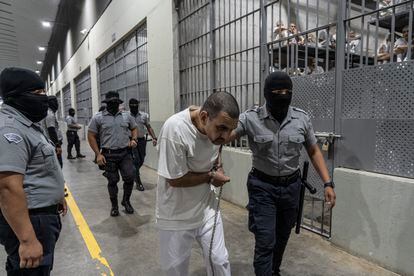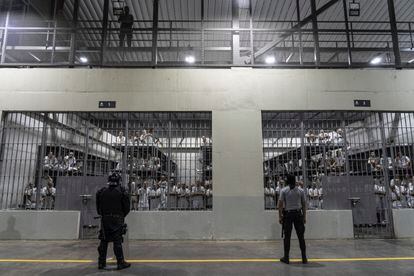
It never gets dark here. Artificial light bathes the cells and the inner courtyard 24 hours a day. The prisoners sleep on the metal sheeting of iron beds piled up to the ceiling. A closed-circuit camera watches over them like a silent god. They eat beans and rice with their hands because forks and knives could become deadly weapons. They wash their bodies and brush their teeth in stone basins and relieve themselves in two toilets at the back, in full view of everyone. They go out into a huge internal corridor for a maximum of 30 minutes a day; their feet and hands are shackled, keeping them hunched over and subdued as they walk on smooth cement. Hooded policemen armed with rifles watch them from the roof. Everything smells new in the facility; time has not yet passed them by. The inmates do calisthenics several times a week, a series of body-weight exercises that keep them sinewy. Most of the time they are alone with their thoughts. In each room, there are two Bibles, although the prisoners do not receive any spiritual guidance. Behind bars, one sees shaved heads and tattooed faces. If they wanted to escape, they would have to climb four walls that are 60 centimeters (23.6 inches) thick and three meters (9.8 feet) high with barbed wire at the top. The gravel floor would make their footsteps audible. They will never again experience love — or even sex — as free people. They are not allowed phone calls or visits. They have slipped into a black hole, an eternal, cold and dreary non-place.
“It’s impossible to escape. These psychopaths are going to spend their entire lives behind bars here,” says the prison director, a stocky, bespectacled man who does not want to reveal his name. The Terrorism Confinement Center (Cecot), El Salvador’s maximum-security prison — the Alcatraz of Central America —opened just a year ago. Nayib Bukele’s eyes light up when he talks about this place. In just 20 months, the young president has taken down the two main gangs, Mara Salvatrucha (MS-13) and Barrio 18. Under a state of exception in which the army has taken to the streets and constitutional freedoms have been suspended, the president has arrested over 70,000 people. He has locked up the young people of entire neighborhoods, where it was previously impossible to enter without risking one’s life. The government has publicized the prison with videos that look like Coppola directed them. The sense of dystopian reality they convey is fascinating. They are uncomfortable to watch, but at the same time it is hard to look away.

Both at home and abroad, Bukele has become immensely popular for his iron fist policy. On Sunday, he swept the presidential elections, winning 85% of the votes. He will remain in power for another five years. The opposition has turned to ashes. Relieved after decades of violence, Salvadorans have given him absolute power. He has taken advantage of this to drift into the authoritarianism with which he controls the judiciary and the armed forces; that control will be multiplied fivefold in the near future. Thus, this small nation has gone from having the highest homicide rate in the world to one of the lowest in the region. Bukele has promised to reach Canadian levels. The impenetrability and lavishness of this hermetic prison match the personality of a president with a megalomaniacal streak.
To enter the prison, one must pass through four posts in large, desolate concrete rooms. Giving off a sinister air, officials with their faces covered up frisk your entire body. They tell you to place your hands on the back of your neck. They ask if you have tattoos. The security checkpoints are equipped with X-rays that expose your intestines. The sound of the bolts on the iron doors sounds forceful. Gradually, a sense of confinement tightens in one’s throat. There are eight modules with an undisclosed number of prisoners; the authorities refuse to specify how many. The capacity of the place is 40,000 people. No one who has entered in handcuffs has ever seen the light of day again. Only a torrent of air seeps through an opening in the ceiling; it is impossible to climb up to it on the smooth walls. The most dangerous prisoners in the country are behind bars. Some are hitmen with dozens of murders under their belt, serving 700-year sentences.

Tonight, they watch from their cells, unmoving; they don’t utter a word. They stand still, arms folded. Silent. They convey a ghostly air with their shaved heads and neatly pressed white uniforms. Their heads are shaved every five days. Almost all of them are tattooed. The names of their gangs have been written in ink, in case there was any doubt as to what their way of life was. They stare with a penetrating gaze, but nothing defiant. They are not used to seeing people from the outside dressed in street clothes. Their nondescript life unfolds between the black suits of hooded policemen who drag them by the arm like cattle. Outside, they were fearsome, they inspired terror; here, now, they only have a sad countenance.
Sign up for our weekly newsletter to get more English-language news coverage from EL PAÍS USA Edition